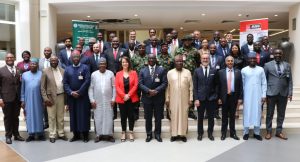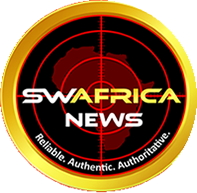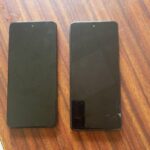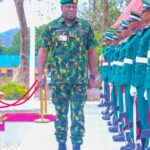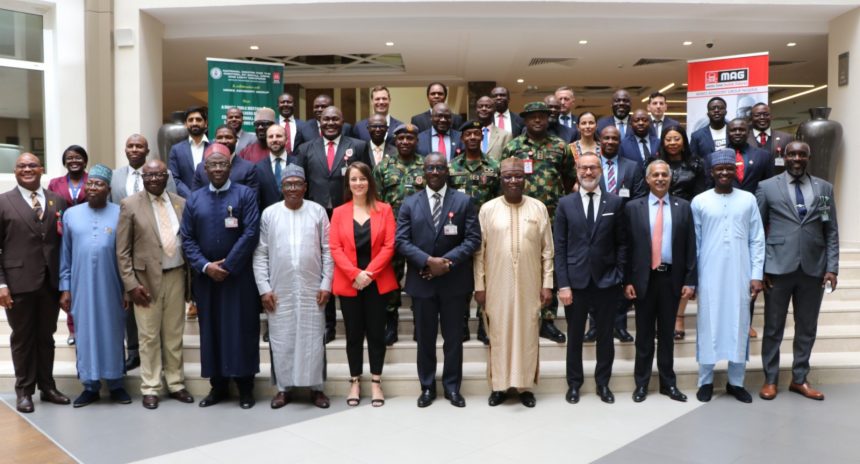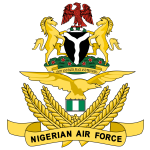By Augustine Ehikioya
To stop proliferation of small arms and light weapons into Nigeria, the National Security Adviser, Mallam Nuhu Ribadu, has called for the support of stakeholders including the European Union and the German Federal Office.
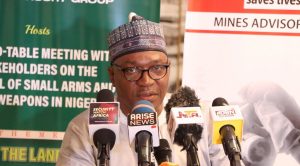
The NSA, who was the Special Guest of Honour, spoke in Abuja through his Special Adviser on Special Duties, Ambassador M. A. Ahmed, on Thursday at a round table meeting organized by the National Centre for the Control of Small Arms and Light Weapons (NCCSALW) in collaboration with Mines Advocacy Group.
Noting that the proliferation challenge can not be handled by a single entity, he said that it is a scourge that undermines security and hampers progress.
At the meeting themed ‘Mapping the Landscape of SALW Proliferation In Nigeria: Gaps and Opportunities’, which was covered by Security Watch Africa (SWA), the NSA said “The proliferation of Small Arms and Light Weapons is a scourge that undermines our security, hampers our progress, and erodes the very foundation of our society.
“It is a challenge that no single entity can combat alone, hence, this roundtable. This is the second of its kind. At the First Roundtable in 2021, a few commitments were made by some of you on the table today but unfortunately, not all have been delivered.
“As we engage in discussions today, let us be guided by the urgency of our mission and the knowledge that the success of the National Centre for the Control of Small Arms and Light Weapons is intrinsically linked to the security and prosperity of our society as whole.
“Each perspective shared, each commitment made, and each partnership forged here is a reminder of previous commitments and will serve as a building block towards a robust and resilient framework for Small Arms and Light Weapons control.
“I urge you, esteemed partners, to lend your support wholeheartedly. Whether it is through policy advocacy, resource allocation, or operational collaboration, your contribution is a lifeline that will empower the Centre to achieve its mandate,” he stated.
Expressing his appreciation to the stakeholders for their commitment to this cause, he hoped the meeting will set the stage for a future where peace prevails, and the threat of small arms and light weapons becomes a shadow of the past.
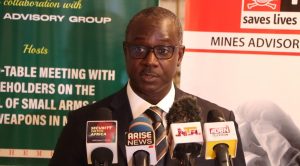
Speaking earlier in his welcome address, the National Coordinator of NCCSALW, Maj. Gen. Abba Mohammed Dikko (Rtd.), urged the President to assent the Centre’s bill in order to improve its operational effectiveness.
According to him, the meeting is a testament to the collective resolve of the Nigerian government, international partners and civil society organizations to confront and overcome the challenges posed by the proliferation of illicit arms within Nigeria’s borders and beyond.
Since the establishment of the National Centre in May 2021, he said, the Centre has been unwavering in its mandate to secure the nation against the threats posed by unregulated arms.
He added “Our efforts have been geared towards fostering synergy among Line Ministries, Departments and Agencies, and fortifying partnerships with reputable national and international stakeholders, as well as Civil Society Organizations (CSOs).
“These collaborations are crucial, as the complexities of SALW proliferation demand a concerted and unified approach.
“The theme of our Roundtable, “Mapping the Landscape of SALW Proliferation in Nigeria: Gaps and Opportunities,” reflects our commitment to not only understanding the extent of the challenge but also to identifying and leveraging opportunities for impactful intervention.
“In collaboration with the Mines Advisory Group, we aim to elevate the discourse on SALW management and control, and to galvanize broad-based support for our ongoing efforts to ensure an illicit-arms-free Nigeria.
“Our objectives are clear and focused. We seek to enhance collaboration with national and international stakeholders, to provide a platform for meaningful interaction, and to explore opportunities for capacity building and technical assistance.
“These objectives align with our strategic goal of eradicating the scourge of illicit arms, thereby safeguarding our nation’s security and facilitating the socio-economic development that our people rightly deserve.
“Key future strategies pivotal to this mission include enhancing personnel skills through targeted training in security management and disarmament. We are also planning an advanced ICT setup for a national database of SALW to unify and streamline inventory management.
“Furthermore, our collaboration with stakeholders needs to be strengthened for advocacy and awareness, alongside ongoing capacity-building initiatives at various levels to ensure we remain at the forefront of SALW regulations and practices.
“A crucial step forward, however, will be the Presidential assent to the Centre’s Bill, which is anticipated to provide the legal authority necessary for better operational effectiveness,” he stated.
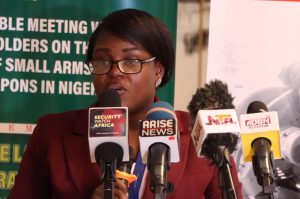
The Head of the European Union (EU) delegates to the meeting, Mrs. Enobong Moma, who is the Programme Manager for Organized Crime West Africa Response to Trafficking, said illicit weapons, which are now more readily available, threaten electoral processes, weaken police authority, promote sexual violence and undermine security efforts to maintain peace.
This, she said, is particularly worrisome in the face of the rise of criminal activity and violent extremism within the country and beyond its borders.
She said “Armed violence increases public health costs. In many cases, insecurity due to the prevalence of illicit arms drives away sorely needed external investments into the country.
“In summary, progress on almost all development indices, is severely hampered in areas where weapons are poorly regulated, poorly controlled and poorly managed,” she stated.
To check the threat, she said that the European Union has taken the initiative to support ECOWAS and by extension, its member states including Nigeria, in implementing the provisions of its Convention on Small Arms and Light Weapons and its vision of promoting peace, security and stability within its Member States.
“A lot of resources are required to finance projects and activities in the fight against the proliferation and illicit circulation of small arms and light weapons – with a view to eliminating them from countries and communities; while promoting development.
“In 2019, the pilot phase of an earlier intervention in the area of small arms (the EU Support to ECOWAS on Small Arms and Light Weapons project) was succeeded by the ongoing Organized Crime West Africa Response to Trafficking (OCWAR-T) programme, implemented by the GIZ and a consortium of implementing agencies.
“With a total budget of EUR 24.4 million this project is part of the regional effort to combat organised crime and trafficking in persons in West Africa by reducing the availability and illicit trafficking of SALW at border community level and strengthening cross-border cooperation as well as the capacity of national actors on SALW control.”
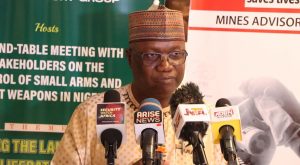
Despite Nigeria’s strong political will to fight the proliferation, the Head of ECOWAS Delegates to the meeting, Dr. Sani Adamu, noted that Nigeria is the only country among the 15 members state that has not put in place an act of parliament.
He stressed that there is need for legislation to back the Centre to continue doing the good work it has been doing.
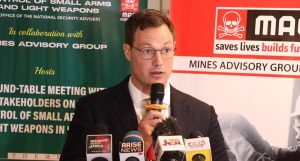
On his part, Mr. Matthias Dold, from the Embassy of the Federal Republic of Germany, assured that Germany will continue to be on the part of the Centre in the fight against the proliferation.

Speaking on behalf of the Mines Advisory Group, Laurie Druelle, said partnership with the Centre has resulted in the training of over 400 security staff on weapons and ammunition management.
Stressing that more than 3000 weapons have been destroyed, she said, over 19 key infrastructures have been built or rehabilitated.
